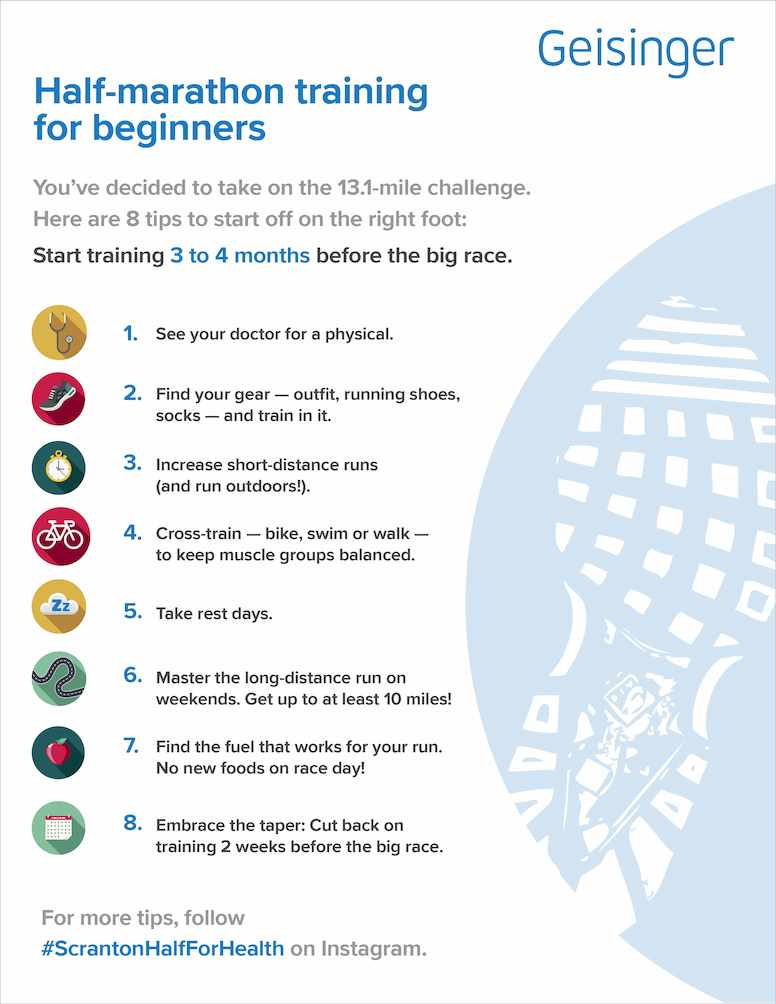Training for the Scranton Half Marathon? Start off on the right foot
It’s only a few months away!
An estimated 3,000 people will be taking to the streets of Scranton on March 29, 2020 for the seventh running of the Scranton Half Marathon. If you’re planning to join the fun, it’s probably time to start training.
“The average runner needs several months to prepare for a 13.1-mile race,” says Dr. John Mercuri, orthopaedic surgeon at Geisinger Orthopaedics and Sports Medicine - Scranton and experienced runner. “It takes time to work up the strength and endurance you will need.”
Whether you’re a seasoned runner or a weekend warrior checking off an item from your bucket list, here are our tips for getting started on the right foot.
Know your body
“Running keeps your heart strong, helps manage blood pressure and promotes the creation of feel-good endorphins,” says Dr. Mercuri. “It also keeps your muscles strong, providing support for your bones and joints.”
However, there are people who might need to meet with their doctor before beginning a training regimen.
“If you have a history of cardiac or lung issues, it’s important to check with your doctor first,” explains Dr. Mercuri. “Running could be helpful, but you must make sure that your goals and training program are safe and realistic.”
Set a goal
Once you’re cleared for takeoff, it’s time to set your goal.
“Completing your first half marathon, regardless of speed, is a great goal,” notes Dr. Mercuri, a former University of Scranton cross-country runner who’s been recognized on its ‘Wall of Fame.’ “But if you have a little experience under your belt or want to use a finish time to gauge your training, determining a goal pace will be very helpful.”
For example, the average half marathon completion time for men is 2:05:00, while the average time for women is 2:24:00. Experienced runners often aim to complete their run in under two hours, or just over 9:09 minutes per mile.
Half marathon courses are often staffed by a group of runners called ‘pacers’ who will run the entire race at a steady rate, helping you track your own speed.
Train at your own pace
With a goal in mind, it’s easier to build your training program. A realistic training plan will take between three and four months, leaving time to spare if you have a busy week at work or catch a cold.
Those assessments of your health and running history should help shape your program. You might also consider an app or training guide from a trustworthy source. Local running clubs are another great option.
“The art of training is in the consistency of your mileage and workouts,” adds Dr. Mercuri. “It’s important to start small and slowly ramp-up your training at moderate—not extreme—intervals. A classic rule of thumb is to never increase by more than 10 percent per week.”
A nutrition plan is just as important as your workout program while training. You will be burning about 100 calories per mile while running—maintaining a strong store of energy and nutrients will keep you going.
Whole grains provide carbohydrates to keep a steady flow of energy, while nuts and avocados deliver healthy fats, and meats supply protein.
Rest and recuperation are also important ingredients for success. “Make sure to sleep enough each night, and plan to have at least one day off from running each week. This will help prevent overuse injuries,” says Dr. Mercuri.
Don’t overdo it in the eleventh hour
If you’re nearing completion on your training plan or are approaching race day, it’s important to give your body some time to rest and prepare. This is known as ‘tapering.’
“Two weeks before your race, you should start running less mileage but at a slightly faster pace,” says Dr. Mercuri. “You should also be focusing heavily on your sleep and hydration. It’s important to keep the body well-fueled with a balanced diet, drink plenty of fluids and rest.”
Geisinger is a proud sponsor of the Scranton Half Marathon. For more information on registering, click here.
Next steps
Make an appointment with John Mercuri, MD
Learn more about orthopaedics and sports medicine at Geisinger






